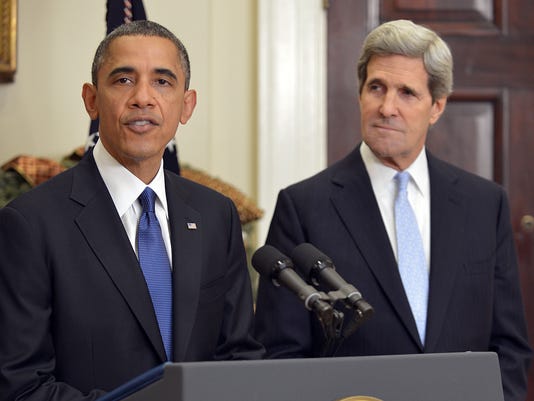- Recent events have cast a shadow on US stature and presence in the Asian-Pacific region
Khaleej Times
Howard LaFranchi

The first is the Philippines’ mercurial president, Rodrigo Duterte, who on Wednesday announced he would seek the departure of all US troops in his country within two years. The second is the US election campaign, in which both Democrat Hillary Clinton and Republican Donald Trump have insisted they would reject the administration’s Trans-Pacific Partnership. The administration touts the 12-nation trade pact, known as TPP, as the economic and strategic cornerstone of Obama’s “pivot” or “rebalance” to Asia. Both the cancellation of the US military presence in the Philippines – a historical ally – and the failure of TPP would deal sharp blows to American stature and presence in the Asian-Pacific region.
“This rejection of the US military over there along with the opposition to TPP over here leave the rebalancing to Asia in tatters,” says Lawrence Korb, a former assistant secretary of defense who is now a senior fellow at the Center for American Progress in Washington. “If you don’t have the economic side of the pivot, it’s going to be difficult to do the political or the military.” Without both pieces, “there’s nothing much to it.”
Obama’s pivot envisions a redirection of military assets and economic focus to reinvigorate the US as a Pacific power in the era of a rising China. Duterte’s eviction notice to the US military, served in Tokyo before an audience of business leaders, would not affect many US troops permanently stationed in the Philippines. The US has a small contingent of counterterrorism forces in the southern island of Mindanao, home to a long-running Islamist insurgency. The US has not had permanent military bases in the Southeast Asian nation since 1992.
But Duterte’s plan would seem to portend the end of an Enhanced Defense Cooperation Agreement signed with the US in 2014 that allows US forces regular access to the country’s military bases. On a visit to the Philippines that year, Obama characterised the new defense pact as a 21st-century agreement, underscoring that it was not about reestablishing US bases in the country but about enhancing regional security and the rule-of-law environment necessary to encouraging Southeast Asia’s economic prosperity.
Obama uses a similar argument in calling for passage of TPP, which was signed this year by the US but which would have to be approved by Congress to take effect. Global commerce is enhanced by confidence-building rules, he argues, and it’s better to have democratic, free-market powers like the US writing those rules than countries like China. “While you don’t get to vote on globalisation, trade agreements are how you shape globalisation,” the administration’s trade representative, Michael Froman, told the Council on Foreign Relations in June.
The Philippines is not a party to TPP. But US failure to approve the trade deal would almost certainly aggravate relations with the 11 Pacific Rim countries that are – including some, like Japan, that took considerable political risks at home to join the regional trade deal sought by the US. “What it says to our Asian partners who took us at our word is that we’re not putting our money where our mouth is – and one result could be that we see these countries accommodate with China rather than forming a group with us that opposes China’s expansionist tendencies,” says Korb. Duterte insists his drive to cut military ties to the US is not about severing relations with the US but about forging an “independent” foreign policy – albeit one friendlier toward China. The acerbic Southeast Asian leader may be the most vocal in expressing disenchantment with the US. But others in the region could be prompted by a US rejection of TPP to pursue a similarly independent path from the US – even if they do so more quietly.


